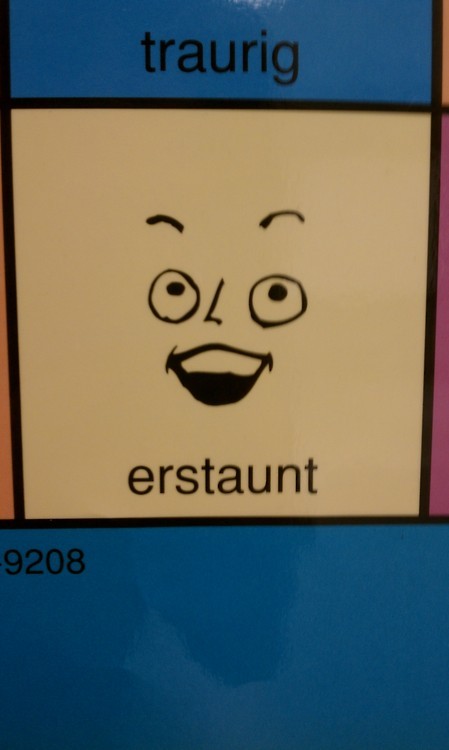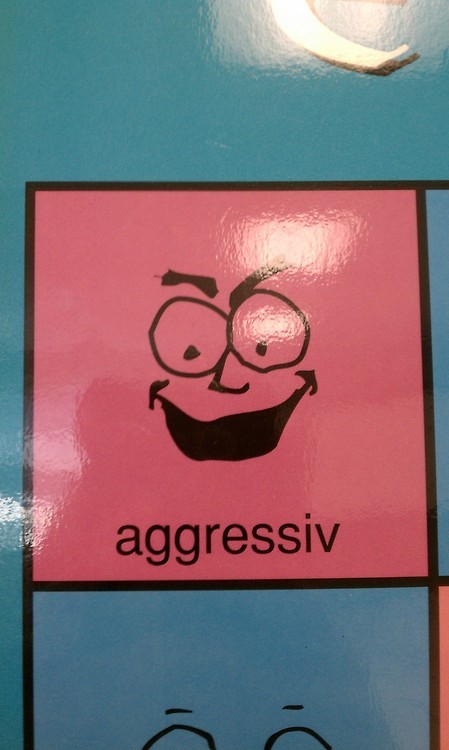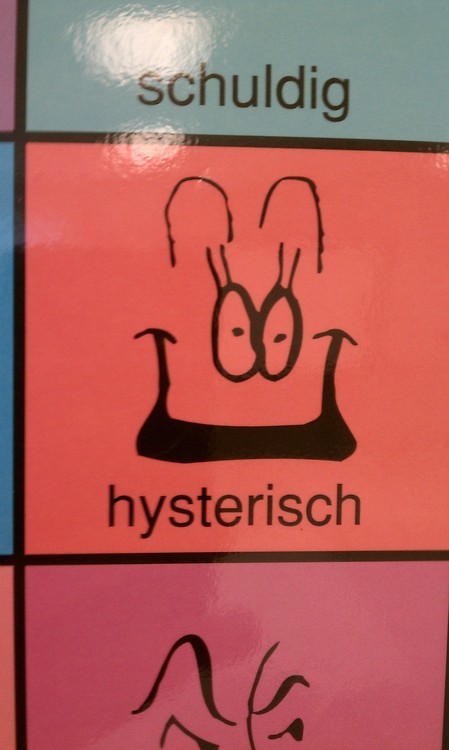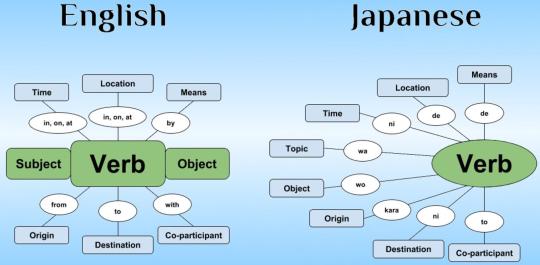Text

Duolingo Vocabulary: Shopping 2
飴 ( 飴 ) hard candy
一番 ( いちばん ) number one, first
上着 ( うわぎ ) jacket, coat
お菓子 ( おかし ) sweets, snack
可也 ( かなり ) quite, considerably
鞄 ( かばん ) bag, satchel, briefcase
かわいい cute
牛肉 ( ぎゅうにく ) beef
少々 ( しょうしょう ) a little bit, a small amount
新幹線 ( しんかんせん ) bullet train
締める ( しめる ) to wear [a necktie or belt]
背広 ( せびろ ) business suit
近い ( ちかい ) close
鶏肉 ( とりにく / けいにく ) chicken [とりにく is much more common as a reading]
払う ( はらう ) to pay
欲しい ( ほしい ) want
帽子 ( ぼうし ) hat
袋 ( ふくろ ) bag
豚肉 ( ぶたにく ) pork
もっと some more/even more
もらう to receive/accept
野菜 ( やさい ) vegetables
安い ( やすい ) cheap
より than, compared to
ダイヤモンド diamond
ネクタイ necktie
バター butter
ブラウス blouse
ワイシャツ dress shirt
Grammar
[X] より [Y] のほうが [adj] です。Compared to [X], [Y] is more [adj]. or [Y] is more [adj] than [X].
お [verb] ください。Please [verb]. The most common way of asking someone to do something is using a verb’s て-form. This is not the case with the 敬語 (けいご) form, the polite or honorific way of speaking to someone, like a shopkeeper would to a customer, for example. In this case, you take the stem of the verb from the 〜ます form and add お〜 as a prefix.
Sentences
私のブラウスがどこにもないです。 わたしのブラウスがどこにもないです。My blouse is nowhere to be seen.
このダイヤモンドは祖母にもらいました。 このダイヤモンドはそぼにもらいました。I received this diamond from my grandmother.
もっと野菜を食べてください。 もっとやさいをたべてください。Please eat vegetables more.
一番近いコンビニはどこですか? いちばんちかいコンビニはどこですか? Where is the closest convenience store?
日本よりアメリカのほうが大きいです。にほんよりアメリカのほうがおおきいです。Compared to Japan, the US is bigger.
一番早い新幹線はどれですか? いちばんはやいしんかんせんはどれですか? Which bullet train is the fastest?
この青い帽子よりその赤い帽子のほうがかわいいです。 このあおいぼうしよりそのあかいぼうしのほうがかわいいです。Compared to this blue hat, that red hat is cuter.
もっとかわいい鞄が欲しいです。 もっとかわいいかばんがほしいです。I want a cuter bag.
今日は昨日より寒いです。 きょうはきのうよりさむいです。 Today is colder than yesterday.
仕事ではネクタイを締めます。しごとではねくたいをしめます。I wear a necktie at work.
今日は私が払います。きょうはわたしがはらいます。 I will pay today.
次は私が払います。つぎはわたしがはらいます。 I will pay next time.
この本は少々高いです。このほんはしょうしょうたかいです。 This book is a bit expensive.
199 notes
·
View notes
Text
how to self teach a new language
have contact with this language by hearing it on movies, tv shows and music. this will help you with your pronunciation skills and with your vocabulary
learn vocabulary and grammar at the same time
read kids books and translate what you don’t know. it might be hard at the beginning, but keep trying
speak to yourself will help you like crazy. I like to pretend that I’m acting or that someone is interviewing me hahah see the magic happens
READ AND WRITE. this is as important as speaking. It used to be so hard for me to write in English and I felt awful because I could actually speak very well. But my writing skills were just a lower level than my speaking level. Thankfully it’s getting better with practice.
try to study a little everyday. if you don’t have time to do so, watch a movie or something, but have this contact with the new language at least once a day
be persistent because the processes of learning a new language can really piss you off. sometimes you will understand nothing and that will drag you down. the difference is to keep pushing until it doesn’t bother you anymore!
9K notes
·
View notes
Note
How can I convince myself to learn kanji. Its so easy to just ignore it in duolingo and I'm lazy. :/ help i need to motivate myself
omg I’m so sorry cause you’re literally LOOKING AT the way I convinced myself to learn kanji. This blog was Made to help myself learn kanji… so if you want to, just do what I did! Make kanji FUN by drawing little flashcards of your own!
Also, look through an article or Japanese lyrics for kanji you don’t recognize and look up the meaning and write them down! That’s how I tend to get some of my more interesting vocabulary cards. It kinda motivates me cause it’s words that I personally will find interesting as opposed to words duolingo is forcing me to learn, which can get monotonous since each lesson goes by a theme!
Another thing I’ve been meaning to do (but haven’t yet) is make a personal Discord server where I store interesting vocabulary. I haven’t done this with Japanese yet for some reason (aka I’m lazy) BUT I’ve done it with Indonesian so here’s a peek at what that server looks like. It just helps me feel organized and it’s easy to get to since I use Discord all the time.
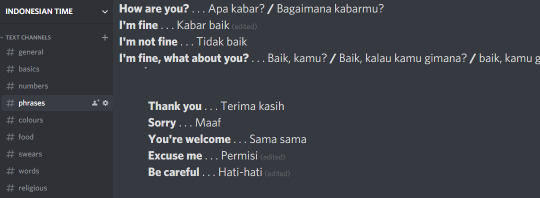
112 notes
·
View notes
Photo
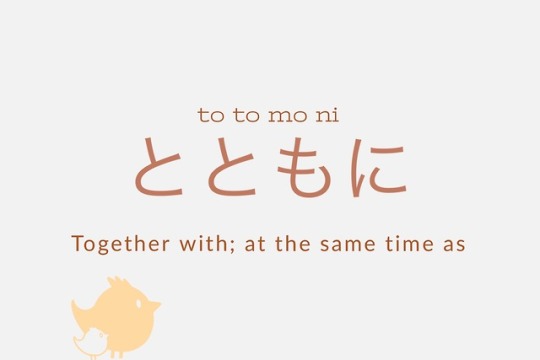
JLPT N3 Grammar
Verb (dictionary form) + とともに
Noun + とともに
Together with; at the same time as
私は家族とともに温泉旅行に行きました。
watashi wa kazoku totomoni onsenryoko ni ikimashita
I went on a hot spring trip with my family.
年を取るとともに体が弱ってきた。
toshi wo toru totomoni karada ga yowattekita
As I become older, my body becomes weaker.
377 notes
·
View notes
Text
The paper work isn't gonna fill out itself I promise you
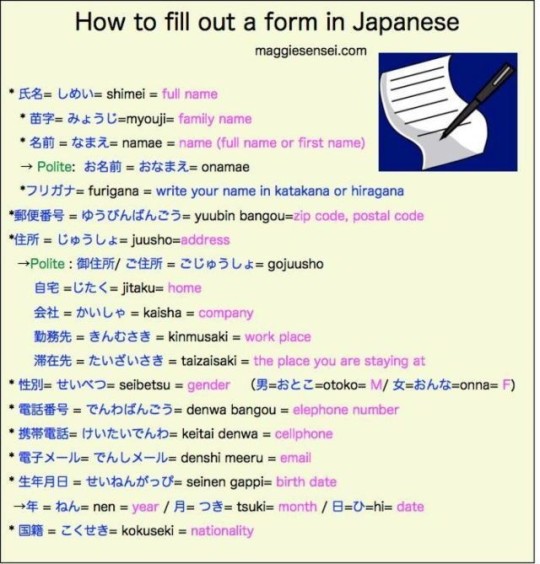
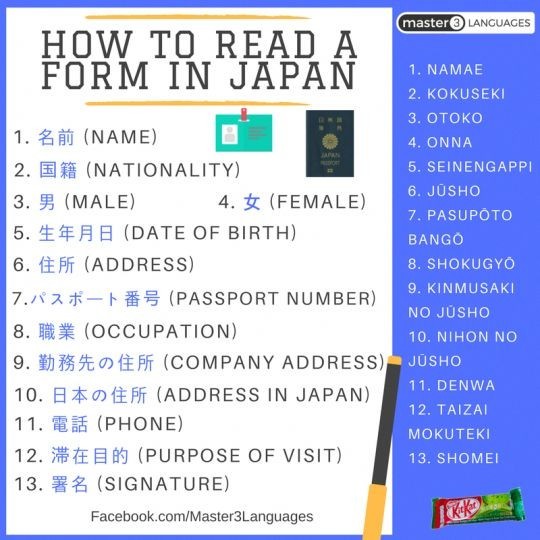
2K notes
·
View notes
Text
Moderately Interesting Japanese Episode 9: Animal Proverbs in Japanese
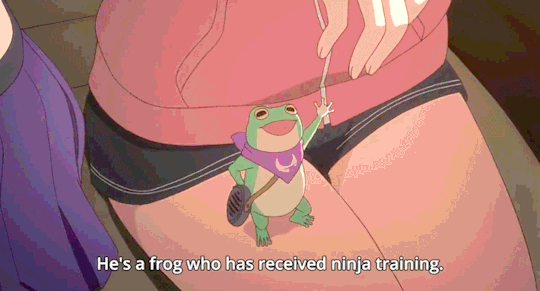
I have no idea what show this is from, but it’s so cute lol
I have a thing for Japanese. As you’ve likely noticed. And there are many aspects of the language that interest me, but one area in particular is 諺 kotowaza, or proverbs.
There are many intriguing proverbs, but today I’m going to focus on those that revolve around animals. How many did you already know?
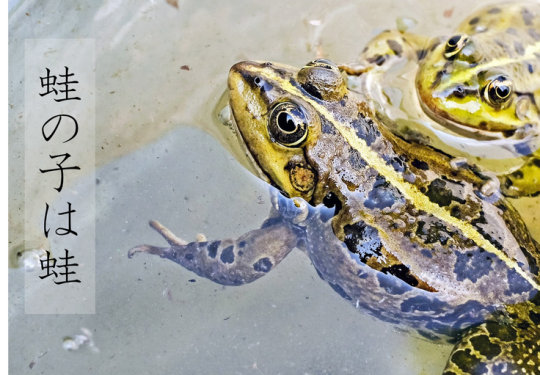
蛙の子は蛙
A frog’s child is a frog
Japanese pronunciation: Kaeru no ko wa kaeru
English equivalent: Like father like son.*
I put an asterisk next to the English equivalent because it is not 100% equal. The English expression “like father like son” is often used in a positive light, expressing pride in the child for taking after the parent’s good qualities. It can also be used in a negative way, but I feel that the positive nuance is stronger.
However, the Japanese expression is only negative. When a frog is born it is not a frog but tadpole, which looks like an entirely different animal. Slowly but surely, though, the frogspawn changes until it is identical to its parents. This is a metaphor for children who seem able of surpassing their parents, but who ultimately wind up just like them.
For example, say that there are a mother and father who are not artistically inclined, and their young daughter draws a pretty good picture. They think that she will become a great drawer much better than they could ever be, but as time passes they realize that she is just as mediocre at drawing as they are. They may sigh and say, “Kaeru no ko wa kaeru.”
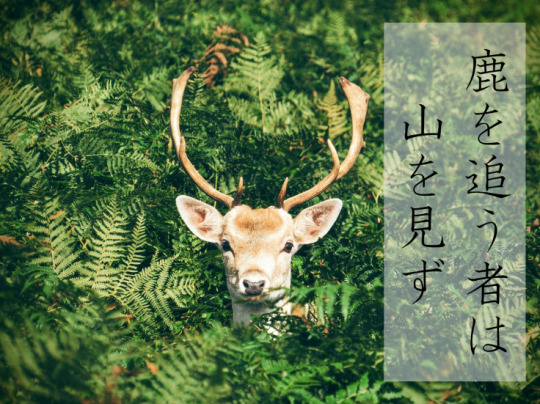
鹿を追う者は山を見ず
He who chases the deer fails to see the forest
Japanese pronunciation: Shika wo ou mono wa yama wo mizu
English Equivalent: You cannot see the wood for the trees.
Imagine a hunter who chases a swift deer through the mountain forest. He is so intent on his prey that he does not realize where he going, and by the time he has caught the deer, he is completely lost and darkness is falling. This expression is about people who are so fixated on one thing that they lose sight of other important things.
This expression is very similar to the English “You cannot see the wood for the trees,” which refers to someone who does not notice small but crucial details.

猫に小判
Gold before cats
Japanese pronunciation: Neko ni koban
English equivalent: Pearls before swine
A “koban” is a large gold oval coin that was used for many centuries as currency in Japan. You could think of it as a hundred dollar bill in terms of worth compared to other Japanese coinage at the time.
Naturally, while a koban held a large amount of significance for any person, if you gave it to a cat the cat wouldn’t know what to do with it. It would probably give it a curious whiff and then walk away. This expression is used when someone’s gift or efforts are wasted on the recipient. It’s the exact same as the English “pearls before swine.”
Also, as a fun little side-note, anybody who’s in my generation or younger should know this, but can you name the first-generation cat Pokemon that was a Team Rocket henchman? Do you remember what he had on his forehead?

Who’s that Pokemon?! It’s Meowth! The golden coin on his forehead is shaped like a koban and is a reference to this proverb. There’s a fun fact you can share with your Pokemon-loving friends.

前門の虎、後門の狼
A tiger at the front gate, a wolf at the back gate
Japanese pronunciation: Zenmon no tora, koumon no ohkami
English equivalent: Between the devil and the deep blue sea, or, between a rock and a hard place
Imagine that you have sneaked into the enemy’s fortress but were seen by the guards. You must escape through either the front or rear gates of the castle walls, but at the front gates waits a ferocious tiger and at the rear gates snarls a hungry wolf. Either will end poorly for you, yet you must choose one or the other. This expression refers to a situation in which neither of the available options are good.
When thinking of an equivalent English expression, the first one that came to mind was “between a rock and a hard place,” but it turns out that this expression is only about 100 years old. I wanted something with a bit more seniority, and that was when I stumbled across “between the devil and the deep blue sea,” which I had only known as a lyric in an Aerosmith song until then haha. It turns out this expression was first recorded in English almost 400 years ago though.

猫に鰹節の番をさせる
Setting the cat to guard the dried fish
Japanese pronunciation: Neko ni katsuobushi no ban wo saseru
English equivalent: Setting the fox to guard the henhouse
I really like this one. First, you need to know what “katsuobushi” is, which I loosely translated as “dried fish.” It’s actually tissue paper-thin shavings of dried bonito, and cats absolutely love the stuff. And why wouldn’t they? It’s got the strong taste and smell of fish that they crave without the hassle of having to pick out bones or tear through scales.
Therefore, you can imagine that a cat would not a trustworthy guard make. This expression is identical to the English “setting the fox to guard the henhouse.”
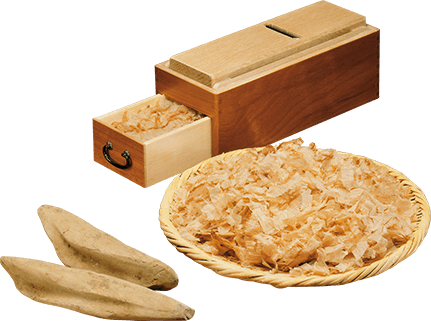
They smoke the bonito for a ridiculously long time until it looks like a fossilized banana, and then they shred it up with a fancy box. Voila, katsuobushi.
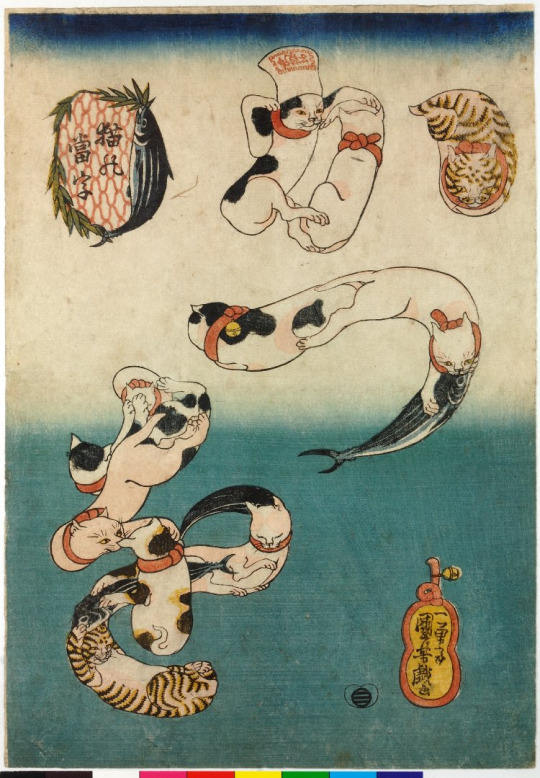
This is an official advertisement for katsuobushi from about 1843. The cats are spelling out かつを (katsuo).
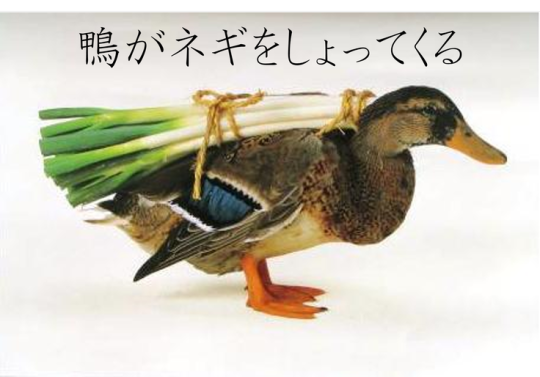
鴨がネギをしょってくる
A duck comes bringing leeks
Japanese pronunciation: Kamo ga negi wo shottekuru
English equivalent: ??
This one is a bit of head-scratcher lol. First, you need to know that there is a Japanese dish called “kamo nabe,” which is a duck stew with leeks. If a duck comes to you on its own, that in and of itself is a good thing for you. If it is also carrying leeks, it is even better. In other words, this expression is used when two or more convenient/beneficial things happen at the same time.
However, there is another underlying message of this expression that makes it difficult to find a matching English expression. That is, that the duck who unknowingly seals his fate is naive/foolish. Also, a duck is seen as an easy-to-trick or simple-minded bird. (Think of the English expressions “sitting duck” and “lame duck.”)
Specifically, this expression is used when Person A unknowingly does something beneficial for Person B that will later come back to hurt Person A.
I hunted for an equivalent expression in English but couldn’t find one. If you know of one in English or another language, please let me know in the comments!
Also, there is another Pokemon based on this expression. Do you know which one it is?
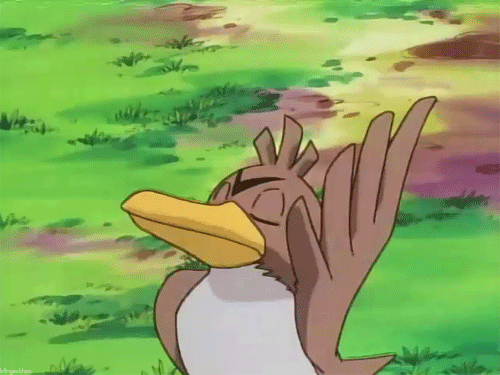
Yep, it’s Farfetch’d! Its name in Japanese is カモネギ (Kamonegi), or Leek Duck. Two Pokemon facts in one post? How much better can it get?

取らぬ狸の皮算用
Counting the pelts of raccoon dogs one has yet to catch
Japanese pronunciation: Toranu tanuki no kawazanyou
English equivalent: Counting your chickens before they’ve hatched
The Japanese version of this well-known expression is decidedly darker than the English one. Imagine a hunter laying a dozen traps for raccoon dogs (called “tanuki” in Japanese) and bragging to his friends how he was going to catch 12 in a day. Upon checking the traps, he sees that he has only caught five. His friends would say, “Don’t count your pelts before you’ve caught them.”

立つ鳥跡を濁さず
A bird taking flight does not foul the water
Japanese pronunciation: Tatsu tori wa ato wo nigosazu
English equivalent: Burn no bridges
This expression can be heard on an almost daily basis in Japan. When a bird takes off from the water, it leaves behind clear, clean water only. There is no trace that it was ever there once the ripples have faded.
This is most commonly used when someone quits their job. It is important to leave no unfinished business or messes for your coworkers to clean up after you, and of course you want to leave on a good note with everyone. When you depart, you should make sure that you leave no unfavorable traces of yourself behind.
I guess that the closest English expression would be “burn no bridges,” though I saw several people stating “It’s an ill bird that fouls its own nest” as an equivalent. I feel like that expression is different, though, because it focuses more on the the perpetrator and less on the people around him, while the Japanese expression is all about making sure not to inconvenience others.
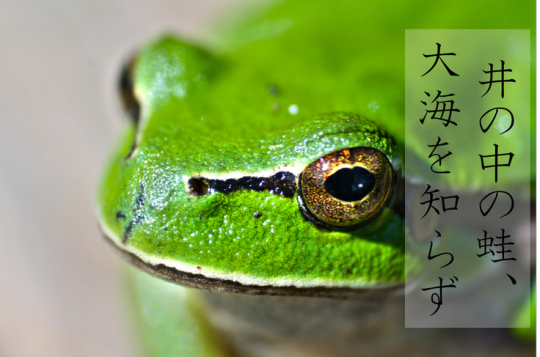
井の中の蛙、大海を知らず
A frog at the bottom of a well knows nothing of the great ocean
Japanese pronunciation: I no naka no kawazu, taikai wo shirazu
English equivalent: He that stays in the valley shall never get over the hill.
We all know at least one person who is woefully narrow-minded, not for lack of effort but simply because their world extends only to their city limit. They do not travel, do not have friends from varied backgrounds, and do not actively seek out the unfamiliar. This leaves them unaware of all the world has to offer.
The Japanese expression summarizes this predicament beautifully. A frog living in the bottom of a well may think that he is in the great expanses of the sea, but in actuality is in a prison, starved from all the wonders of light and sensation that are waiting outside the well.

The End!!
I hope you guys enjoyed today’s Moderately Interesting Japanese. Work has been…absolute chaos. My old boss was moved to a new project within the company. They’re shorthanded and I’ve been asked to translate over 30,000 pages of high level tech training materials (that I have no experience/knowledge of) into Japanese…in 5 weeks…on top of my regular duties… Needless to say I am exceedingly close either to drinking enough caffeine that my third eye opens, my chakras align, and I become an omnipotent god, or a mental breakdown. But I only have 2,000 more pages to go until I’m finished!
My queue of word of the day posts is running low and it might be a few days until I can get some more ready, but please be patient. I still have tons of cool words I want to share with you! ♡
4K notes
·
View notes
Text
2K notes
·
View notes
Text
Japanese Phrases for Essays
初めに・はじめに to begin with; first of all
まず first of all; to start with
最初に・さいしょに first
第一に・だいいちにfirst
劈頭第一・へきとうだいいち first and foremost
次に・つぎに next
更に furthermore
そして and; thus
その上に・そのうえに in addition; furthermore
他に・ほかに in addition; besides
また also
並びに・ならびに both ~ and ~; ~ as well as ~
及び・および and; as well as
それだけでなく not only~ but also ~
のみならず besides; as well as
しかも moreover; furthermore; nevertheless; and yet
おそらく probably
しかし however
すでに already
その結果・そのけっか as a result
それにしては considering that
それに対して・それにたいして contrary to this
ため in order to; because of
というのは the reason why is
にしたがって following; in accordance with
にとって for; concerning
によって due to; because of
一方で・いっぽうで on the other hand
全く・まったく really; truly; entirely
全て・すべて overall; in general
多数の・たすうの countless; majority
必ず・かならず definitely
急速に・きゅうそくに rapidly increasing
ますます increasingly; more and more; decreasingly (when declining); less and less
次第に・しだいに gradually; little by little
現在・げんざい nowadays
確かに・たしかに it is true that (but)
要すると・ようする in short
非常に・ extremely
要するに・ようするに in short
全く・またく absolutely
絶対・ぜったい absolutely
誠に・まことに absolutely
〜によると according to
〜によって due to
従って・したがって accordingly; therefore; consequently
事実上・じじつじょう actually; as a matter of fact; in reality
だって also
結局・けっきょく after all
おしまい in closing
終わりに・おわりに to finish; to end; to close
やはり after all
ようやく finally
加えて・くわえる in summary
それに加え・それにくわえ to summarise
最後に・さいごに in conclusion
8K notes
·
View notes
Text

A good way to learn a language is through immersion! Though I may be quite far from Japan, there are ways that I immerse myself in the language from home. One of those ways is through one of my favorite games that I play: Minecraft! In Japan, Minecraft is colloquially referred to by its shorthand, マイクラ. This is going to be the first of a series of vocab lists that I’ve accumulated while playing Minecraft in Japanese. If you enjoy Minecraft and learning Japanese, I suggest try it!
石 ( いし ) stone
斧 ( おの ) axe
完了 ( かんりょう ) completion
原木 ( げんぼく ) (wooden) log
小麦 ( こむぎ ) wheat
砂 ( すな ) sand
つるはし pickaxe
97 notes
·
View notes
Text
youtube
Casual reminder that the German Magic Winx Theme Song is better then the one you grew up with 💅
111 notes
·
View notes
Text
Looking for Japanese Langblr’s!
I’ve delved into learning Japanese, but I would LOVE to have a lil network of people who are doing the same !! If anything, just having japanese langblr’s to follow would be great ^-^ Or, if you post any studyblr material in Japanese, that would be great too!!
116 notes
·
View notes
Text

Found a Japanese word to describe me and all my hobbies
640 notes
·
View notes


